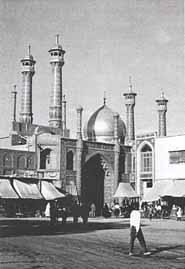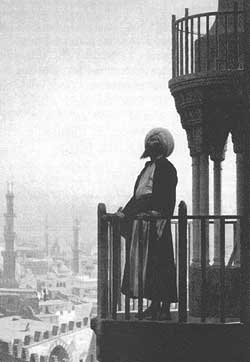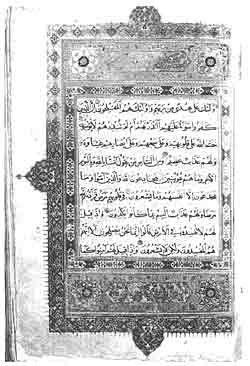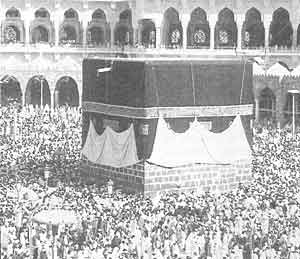|
Mohammed, Islam
and Mohammedanism
Adapted from the
Catholic Encyclopaedia
By Father Gerard Rusak and Father Dominique De Vriendt
Islam is an Arabic
word which, since Mohammed's time, has acquired a religious and technical
significance denoting the religion of Mohammed and of the Koran, just
as Christianity denotes that of Jesus and of the Gospels, or Judaism that
of Moses, the Prophets, and of the Old Testament.
I.
THE FOUNDER
| |

Hazrat-e-Mahsoumeh
Mosque, in the holy city of Qum, Iran
|
Mohammed, "the
Praised One", the prophet of Islam and the founder of Mohammedanism,
was born at Mecca A.D. 570. He spent his early life as a shepherd and
an attendant of caravans, and at the age of twenty-five married a rich
widow, fifteen years his senior. She bore him six children, all of whom
died very young except Fatima, his beloved daughter.
On his commercial
journeys to Syria and Palestine he became acquainted with Jews and Christians,
and acquired an imperfect knowledge of their religion and traditions.
He was a man of retiring disposition, given to prayer and fasting, and
was subject to epileptic fits. In his fortieth year (A.D. 612), he claimed
to have received a call from the Angel Gabriel, and thus began his active
career as the prophet of Allah and the apostle of Arabia. By his preaching
and his attack on heathenism, Mohammed provoked persecution which drove
him from Mecca to Medina in 622, the beginning of the Mohammedan Era.
At Medina he was recognized as the prophet of God, and his followers increased.
He took the field against his enemies, conquered several Arabian, Jewish,
and Christian tribes, entered Mecca in triumph in 630, demolished the
idols of the Kaaba, became master of Arabia, and finally united all the
tribes under one emblem and one religion. In 632 he made his last pilgrimage
to Mecca at the head of forty thousand followers, and soon after his return
died of a violent fever in the 63rd year of his age, and the year 633
of the Christian era.
It seems, Mohammed
was at first sincere, but later, carried away by success, he practised
deception wherever it would gain his end. After the death of his first
wife, he became a prey to his evil passions. Some attribute his alleged
revelations to epileptic fits, or to "a paroxysm of cataleptic insanity".
It is likely the prophet was false even to the ethical traditions of the
idolatrous brigands among whom he lived, and grossly violated the easy
sexual morality of his own system. After this, it is hardly necessary
to say that, Mohammed fell very far short of the most elementary requirements
of Scriptural morality. This judgment, however harsh, rests on evidence
which comes all from the lips and the pens of his own devoted adherents.
II.
THE SYSTEM
A. History of growth,
Location, Organisation and Divisions
History of growth:
After Mohammed's death, Mohammedanism aspired to become a world power
and a universal religion. The weakness of the Byzantine Empire, the unfortunate
rivalry between the Greek and Latin Churches, the schisms of Nestorius
and Eutyches, the failing power of the Sassanian dynasty of Persia, the
lax moral code of the new religion, the power of the sword and of fanaticism,
the hope of plunder and the love of conquest - all these factors,
combined with the genius of the caliphs, the successors of Mohammed,
to effect the conquest, in considerably less than a century, of Palestine,
Syria, Mesopotamia, Egypt, North Africa, and the South of Spain. The Moslems
even crossed the Pyrenees, threatening to stable their horses in St. Peter's
at Rome, but were at last defeated by Charles Martel at Tours (France),
in 732, just one hundred years from the death of Mohammed. This
defeat arrested their western conquests and saved Europe. In the eighth
and ninth centuries they conquered Persia, Afghanistan, and a large part
of India, and in the twelfth century they had already become the absolute
masters of all Western Asia, Spain and North Africa, Sicily, etc. They
were finally conquered by the Mongols and Turks, in the thirteenth century,
but the new conquerors adopted Mohammed's religion and, in the fifteenth
century, overthrew the tottering Christian Byzantine Empire (1453). At
the naval battle of Lepanto, on Oct. 7, 1571, later on commemorated
by the Feast of Our Lady of the Rosary, between the Christians and the
Turks, the fleet of the Holy League, commanded by John of Austria, virtually
destroyed the fleet of the Ottoman Empire, ending the threat of Turkish
naval supremacy in the Mediterranean. But from Constantinople they still
threatened the German Empire. They were successfully defeated at the gates
of Vienna in 1683. Ottoman troops under the grand vizier
Kara Mustapha lay siege to Vienna in July. A German-Polish army led by
John III Sobieski of Poland lifts the siege September 12 on the feast
of the Holy Name of Mary, after 58 days. Is it by chance that the great
victories over the Muslims are attributed to Our Lady? Sobieski had told
his soldiers to have no other words on their lips but the names of Jesus
and Mary. Coming upon the Muslim camp, the Polish leader saw silken tents,
and Moslem women slaughtered, lest they be taken by the Christians. Sobieski
returned home to his wife Maria whom he loved dearly. He wrote to Pope
Innocent XI: “Veni, Vidi, Deus Vicit.” “I came, I saw, God conquered.”
| |

The Imam
calling the people for prayer
|
Location: Today,
Islam counts at least 950 million faithful and stretches from the west
coast of Africa to the South of Philippines across a broad band including
Tanzania, Central Asia and western China, India, Malaysia, and Indonesia.
It numbers several million in North America.
Organisation: Theoretically,
the state and religious community are one, administered by a caliph.
In practice, Islam is a loose collection of congregations united by a
very conservative tradition.
Divisions: The
2 major sects of Islam are the Sunni (orthodox) and the Shiah. The Shiah
regard Ali, the son-in-law of Mohammed, as the legitimate successor of
Mohammed, disregarding the three caliphs who actually did succeed him.
The Shiah, who number about 10% of all Muslims, believe in 12 imams, perfect
teachers, who still guide the faithful from Paradise. The Shiah affirm
human free will; the Sunni are deterministic. The Shiah observe the ceremonies
of the month of fasting; they permit temporary marriages, contracted for
a certain sum of money, whilst the Sunni maintain that Mohammed forbade
them. The Shiah include the Fire-Worshippers among the "People of
the Book", whilst the Sunni acknowledge only Jews, Christians, and
Moslems as such. The Shiah admit a principle of religious compromise in
order to escape persecution and death, whilst the Sunni regard this as
apostasy.
There are many subdivisions,
various theological schools and political factions, but in spite of these
divisions, however, the principal articles of faith and morality, and
the ritual, are substantially uniform.
B.
Tenets
The principal tenets
of Mohammedanism are laid down in the Koran. As aids in interpreting the
religious system of the Koran we have: first, the so-called "Traditions",
which are supposed to contain supplementary teachings and doctrine of
Mohammed, a very considerable part of which, however, is decidedly spurious;
second, the consensus of the doctors of Islam represented by the most
celebrated imams, the founders of the various Islamic sects, the Koranic
commentators and the masters of Mohammedans jurisprudence; third, the
analogy, or deduction form recognized principles admitted in the Koran
and in the Traditions. Mohammed's religion, known among its adherents
as Islam, contains practically nothing original; it is a confused combination
of native Arabian heathenism, Judaism, Christianity, Sabiism (Mandoeanism),
Hanifism, and Zoroastrianism.
The system may be
divided into two parts: dogma, or theory; and morals, or
practice. All Mohammedan dogma is supposed to be expressed in the one
formula: "there is no God but the true God; and Mohammed is His prophet."
But this one confession implies for Mohammedans six distinct articles
concerning: (a) God; (b) His angels; (c) His Scripture; (d) His prophets
; (e) the Resurrection and Day of Judgment; and (f) God's absolute and
irrevocable decree and predetermination both of good and of evil.
(1)
Dogma
|

Egyptian
manuscript of the Koran,
from the 16th Century
|
|
a) The doctrines of
Islam concerning God - His unity and Divine attributes - are essentially
those of the Bible; but to the doctrines of the Trinity and of the Divine
Sonship of Christ, Mohammed had the strongest antipathy.
b) Mohammedan angelology
and demonology are almost wholly based on later Jewish and early Christian
traditions. Besides angels and devils, there are also other creatures
of fire, able to eat, drink, propagate, and die; some good, others bad,
but all capable of future salvation and damnation.
c) Scripture: The
Koran, the words of God; Hadith, collections of the sayings of the Prophet.
d) The number of prophets
sent by God is said to have been about 124,000, and of apostles, 315.
Of the former, 22 are mentioned by name in the Koran - such as Adam, Noah,
Abraham, Moses, Jesus. According to the Sunni, the Prophets and Apostles
were sinless and superior to the angels, and they had the power of performing
miracles.
e) God rewards good
and punishes evil deeds. He is merciful and is easily propitiated by repentance.
The punishment of the impenitent wicked will be fearful, and the reward
of the faithful great. All men will have to rise from the dead and submit
to the universal judgment. The Day of Resurrection and of Judgment will
be preceded and accompanied by signs some of which are identical with
those mentioned in the New Testament. The Resurrection will be general
and will extend to all creatures (contrary to the teaching of the Catholic
Faith). The torments of hell and the pleasures of Paradise, but especially
the latter, are proverbially crass and sensual. Hell is divided into seven
regions: of which one is reserved for the Christians. While the damnation
of all infidels (non-Moslems) will be hopeless and eternal, the Moslems
guilty of heinous sins, will be delivered from hell after expiating their
crimes (needless to say, this is absolutely against Catholic dogma).
|

The
Kaaba in the Great Mosque at Mecca,
containing the sacred black stone, brought,
according to Koran, to Abraham by archangel Gabriel
|
|
The joys and glories
of Paradise are as fantastic and sensual as the lascivious Arabian mind
could possibly imagine. Rivers flowing with water, with wine and with
honey; Springs containing rubies and emeralds, ravishing girls of pure
musk and free from all natural impurities, defects, and inconveniences,
modest and secluded in pavilions of hollow pearls. Each individual will
also possess a large mansion of at least 80,000 servants, 72 wives, 300
waiter, the food being served in dishes of gold, of 300 kinds at once,
containing each a different kind of food, and an inexhaustible supply
of wine and liquors, magnificent garments and gems conformable to the
delicacy of their diet, clothing of the richest silks and brocades, bracelets
of gold and silver, crowns set with pearls, silken carpets, couches, pillows,
etc. And in order that they may enjoy all these pleasures, God will grant
them perpetual youth, beauty, and vigour. Music and singing will also
be ravishing and everlasting. Needless to say, this materialistic paradise
is not the Heaven of the Catholic Faith. We believe there will be pleasures
proper to a glorified body, but we place the essential of happiness of
heaven in that of the spirit.
f) The Mohammedan
doctrine of predestination is equivalent to the false doctrine of fatalism.
They believe in God's absolute decree and predetermination both of good
and of evil; viz., whatever has been or shall be in the world, whether
good or bad, proceeds entirely from the Divine will, and is irrevocably
fixed and recorded from all eternity. The possession and the exercise
of our own free will is, accordingly, futile and useless. This again is
contrary to Catholic dogma.
(2)
Practice
The four points relating
to morals, or practice, are: (a) prayer, ablutions, and purifications;
(b) alms; (c) fasting; and (d) pilgrimage to Mecca.
The daily prayers
are five in number: before sunrise, at midday, at four in the afternoon,
at sunset, and shortly before midnight. All prayers must be made looking
towards Mecca, and must be preceded by washing, neglect of which renders
the prayers of no effect. Public prayer is made on Friday in the mosque,
and is led by an imam. Only men attend the public prayers, as women seldom
pray even at home. Prayers for the dead are meritorious and commended.
Fasting is commended at all seasons, but prescribed only in the month
of Ramadan. It begins at sunrise and ends at sunset, and is very
rigorous, especially when the fasting season falls in summer. Pilgrimage
to Mecca once in a lifetime is a duty incumbent on every free Moslem of
sufficient means and bodily strength, and the ceremonies are strictly
similar to those performed by the Prophet himself.
(3)
Morals
It is hardly necessary
here to emphasize the fact that the ethics of Islam are far inferior to
those of Judaism and even more inferior to those of the New Testament.
Without doubt, there is a great deal to admire and to approve; but of
originality or superiority, there is none. What is really good in Mohammedan
ethics is either commonplace or borrowed from some other religions, whereas
what is characteristic is nearly always imperfect or wicked.
The principal sins
forbidden by Mohammed are idolatry and apostasy, adultery, false witness
against a brother Moslem, games of chance, the drinking of wine or other
intoxicants, usury, and divination by arrows. Brotherly love is confined
in Islam to Mohammedans. Any form of idolatry or apostasy is severely
punished in Islam, but the violation of any of the other ordinances is
generally allowed to go unpunished, unless it seriously conflicts with
the social welfare or the political order of the State. Infanticide is
strictly forbidden by Mohammed.
Religion and the State
are not separated in Islam. Hence Mohammedan jurisprudence, civil and
criminal, is mainly based on the Koran and on the "Traditions".
Slander and backbiting are strongly denounced, although false evidence
is allowed to hide a Moslem's crime and to save his reputation or life.
As regards marriage, polygamy, and divorce, the Koran explicitly allows
four lawful wives at a time, whom the husband may divorce whenever he
pleases. Slave-mistresses and concubines are permitted in any number.
Both husband and wife are explicitly forbidden by Mohammed to seek divorce
on any slight occasion or the prompting of a whim, but this warning was
not heeded either by Mohammed himself or by his followers. Immorality
in general is severely condemned and punished by the Koran, but the moral
laxity and depraved sensualism of the Mohammedans at large have practically
nullified its effects.
Slavery is looked
upon as a practical necessity. Generally speaking males are entitled
to twice as much as females. Murder, manslaughter, and suicide are explicitly
forbidden, although blood revenge is allowed. In case of personal injury,
the law of retaliation is approved.
Mohammed selected
Friday as the sacred day of the week. The most probable motive was the
desire to have a holy day different from that of the Jews and that of
the Christians. It was, however, also a day of solemn gatherings and public
festivities among the pre-Islamic Arabs. Abstinence from work is not enjoined
on Friday, but it is commanded that public prayers and worship must be
performed on that day.
In matters political,
Islam is a system of despotism at home and aggression abroad. The
Prophet commanded absolute submission to the imam. In no case was the
sword to be raised against him. In a Muslim state, the rights of non-Moslem
subjects (called “dhimmis”), are of the vaguest and most limited
kind, and a religious war (Jihad) is a sacred duty whenever
there is a chance of success against the "Infidel". Medieval
and modern Mohammedan persecutions of both Jews and Christians are perhaps
the best illustration of this fanatical religious and political spirit.
For example, in Sudan, since 1956, according to what the Vatican announced
recently, over 3 million Christians have lost their lives in a war waged
against them by the Muslims. Terrorists also remain faithful to such principles
of Islam.
If we consider Catholic
prophecy, it seems, Islam will not be vanquished until Our Lady establishes
the period of peace promised at Fatima.
|